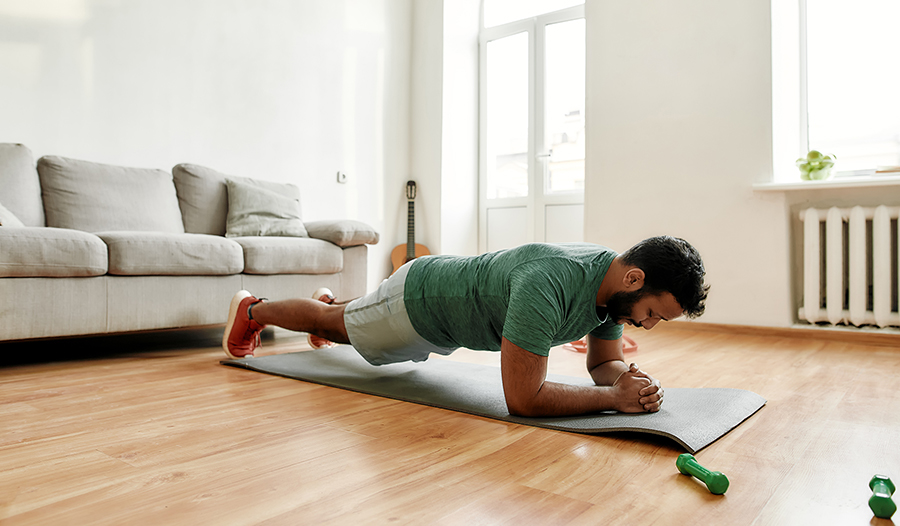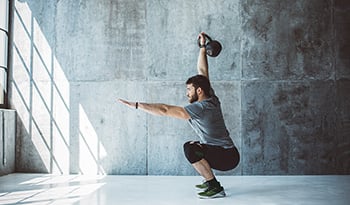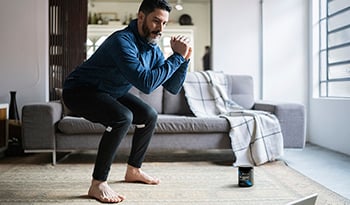5 Ways Exercise Boosts Your Immune System
DISCLAIMER:This blog does not intend to provide diagnosis...
- In this article:
- What Does The Immune System Do?
- How Much Exercise Is Enough?
- 5 Ways Exercise Helps Strengthen the Immune System
- Conclusion

The effects of exercise on good health have been documented for a long time. We all know that being physically active can help maintain a healthy weight and balance our mood. But exercise can significantly support our health and immune system as well.
Medical professionals commonly advise having a regular exercise routine to maintain good health. You must also include a balanced diet of protein, fruits, vegetables, and grains — and if indicated by your doctor — the use of multivitamins and supplements.
Maintaining a healthy lifestyle that includes exercise can boost immunity in many ways. In this article, we will review five ways in which exercise can support your immune system and overall wellbeing.
What Does The Immune System Do?
In simple terms, a strong immune system leads to better defenses against infection.
The immune system represents a complex network of cells and organs that help fight against diseases. The system recognizes harmful agents such as bacteria or viruses, chemicals or toxins, and sometimes even our own cells that may be dangerous or damaging to the body. The immune system reacts to those harmful antigens by mounting a reaction to defend itself — also called an immune response.
When the body mounts an inefficient or weak immune response, problems such as infections and diseases arise. So it's important to maintain a very healthy immune system. Vitamin C is a natural immune booster and can be found in leafy greens, citrus fruits like oranges and grapefruits, as well as in supplement form.
How Much Exercise Is Enough?
According to a study published in the Journal of Sport and Health Science, exercise benefits the immune system with moderate bouts of physical activity. Some studies mention a transient negative effect on the immune system after extreme, prolonged high-intensity physical activity such as marathon running.
General exercise guidelines, better known as physical activity guidelines, state that healthy adults should incorporate moderate-intensity aerobic physical activity and/or vigorous-intensity aerobic activity into their weekly routine. Further, activities that maintain or increase muscular strength and endurance are important to include for greater positive effects. Integrating sports multivitamins into your regimen can help reinforce the benefits you'll reap from consistent exercise.
Be advised that the amount of exercise can vary depending on each person. The types of exercise also differ depending on the type of person and lifestyle. Therefore, you must consult with your doctor before starting an exercise program.
5 Ways Exercise Helps Strengthen the Immune System
1. Helps Slow the Effects of Aging on the Immune System
The effects of exercise on the immune system yield important results as the body ages. Some studies demonstrate that exercise efficiently reduces the effect of aging on the immune system.
The process of aging has a lot of effects on the human body. One of those effects — a decreased function or dysregulation of the immune system — called immunosenescence — refers to the aging-related decline in the immune system. Although a natural process, it can be counteracted or delayed by reshaping our lifestyle. Collagen supplements can help protect your joints and enhance the quality of your skin as you work to build immune strength through exercise.
Data from recent research supports that regular exercise can help to regulate the immune system and delay the onset of immunosenescence. Another effect of aging — the progressive increase in a pro-inflammatory status (also called "inflamm-aging") — can lead to disease.
A study published in Ageing Research Reviews found that regular exercise has a beneficial impact on the immune system’s effector cells, such as the T-cells, neutrophils, and Natural Killer (NK) cells. It showed an increased capacity of proliferation and activity of those cells as well as a reduced number of older, less active T-cells. Black seed, also known as black cumin seed, has been shown to be an effective NK supplement and can work in conjunction with habitual exercise to regulate the immune system and delay the onset of immunosenescence.
2. Supports Blood Circulation and Enhanced Immunosurveillance
Moderate amounts of aerobic activity support heart health and encourage healthy blood circulation. This boost in circulation mobilizes important cells of the immune system such as T-cells, cytokines, neutrophils, and others.
The increased mobilization of these cells enhances immunosurveillance. An enhanced immunosurveillance means the body is more alert and ready to fight against infections. In other words, exercise facilitates an antioxidant and anti-inflammatory state.
This immunostimulatory effect of acute exercise yields may benefits — among them, a boost in the blood of lymphocytes, T-cells, and natural killer cells. These effector cells move from the blood to tissues looking for cells infected with viruses or bacteria or those that have transformed.
Just like a healthy diet, exercise can contribute to general good health and, therefore, to a healthy immune system. It may contribute even more directly by promoting good circulation — allowing immune system cells to move through the body freely and efficiently. Niacin, also known as Vitamin B-3, can help support a healthy circulatory system by optimizing and balancing blood flow throughout your body.
3. Regular Physical Activity Has an Overall Positive Effect
A 2019 article published in the Journal of Sports and Health Sciences mentions increasing evidence that regular moderate physical activity has an overall anti-inflammatory influence. This effect is achieved through several different mechanisms which include improved control of inflammatory signals, the release of certain proteins such as myokines and interleukins, and improved oxygenation.
The author of this study mentions that this effect may be more pronounced when accompanied by weight loss. The article also mentions that obesity and several chronic illnesses involve a constant state of low-grade inflammation, oxidative stress, and immune dysfunction. Exercise training supports healthy immune response and reduces the oxidative stress found in these conditions. The effect of exercise involves a balanced level of antioxidant enzymes such as catalase, superoxide dismutase, and glutathione peroxidase.
4. Burns Calories and Maintains Healthy Body Fat
As mentioned before, obesity creates a state of chronic mild inflammation as demonstrated by balancing circulatory levels of inflammatory proteins and a decrease in anti-inflammatory proteins. This occurs in adults as well as adolescents and children. Several studies demonstrate the association between obesity and impairment of the immune system.
A study published by Cambridge University found that obesity, like other states of malnutrition, is known to impair the immune function by altering leukocyte counts as well as cell-mediated immune responses.
Regular exercise burns calories and can reduce the amount of adipose tissue in the body, and, therefore, supports the immune system's protective functions.
5. Active Lifestyle Facilitates Better Immune Protection after Vaccines
Several studies reveal that people who maintain a regular exercise routine and active lifestyles have a better response to vaccines. Vaccinations represent a true test of the immune system. A good immune system produces an adequate response to vaccines, creating strong immunity against pathogens such as viruses and bacteria.
One study showed an improved antibody response to influenza vaccination in older adults. Research has proven that exercise facilitates long-term immunity after vaccinations — particularly important in the elderly whose immune response to vaccines can be decreased due to the effects of aging.
Conclusion
A routine of moderate aerobic exercise accompanied by strength training can help boost the immune system. Regular exercise, a healthy diet, and stress management techniques such as meditation and aromatherapy can make a difference in maintaining good health.
References:
- Niaid.nih.gov. 2020. Overview Of The Immune System. [online] Available at: https://www.niaid.nih.gov/research/immune-system-overview
- Topics H. Immune System and Disorders | Autoimmune Disease | MedlinePlus. Medlineplus.gov. https://medlineplus.gov/immunesystemanddisorders.html. Published 2020.
- ACSM Exercise Guidelines | 3 Essential Resources. Acsm.org. https://www.acsm.org/all-blog-posts/certification-blog/acsm-certified-blog/2020/09/03/acsm-exercise-guidelines-resources. Published 2020.
- Simpson RJ, Lowder TW, Spielmann G, Bigley AB, LaVoy EC, Kunz H. Exercise and the aging immune system. Ageing Res Rev. 2012 Jul;11(3):404-20. doi: 10.1016/j.arr.2012.03.003. Epub 2012 Mar 21. PMID: 22465452.
- Xia S, Zhang X, Zheng S, Khanabdali R, Kalionis B, Wu J, Wan W, Tai X. An Update on Inflamm-Aging: Mechanisms, Prevention, and Treatment. J Immunol Res. 2016;2016:8426874. doi: 10.1155/2016/8426874. Epub 2016 Jul 14. PMID: 27493973; PMCID: PMC4963991.
- Nieman DC, Wentz LM. The compelling link between physical activity and the body's defense system. J Sport Health Sci. 2019 May;8(3):201-217. doi: 10.1016/j.jshs.2018.09.009. Epub 2018 Nov 16. PMID: 31193280; PMCID: PMC6523821.
- Campbell JP, Riddell NE, Burns VE, Turner M, van Zanten JJ, Drayson MT, Bosch JA. Acute exercise mobilises CD8+ T lymphocytes exhibiting an effector-memory phenotype. Brain Behav Immun. 2009 Aug;23(6):767-75. doi: 10.1016/j.bbi.2009.02.011. Epub 2009 Feb 28. PMID: 19254756.
- Turner JE, Brum PC. Does Regular Exercise Counter T Cell Immunosenescence Reducing the Risk of Developing Cancer and Promoting Successful Treatment of Malignancies? Oxid Med Cell Longev. 2017;2017:4234765. doi: 10.1155/2017/4234765. Epub 2017 Jul 2. PMID: 28751932; PMCID: PMC5511671.
- How to boost your immune system - Harvard Health. Harvard Health. https://www.health.harvard.edu/staying-healthy/how-to-boost-your-immune-system. Published 2020. Accessed December 16, 2020.
- de Heredia FP, Gómez-Martínez S, Marcos A. Obesity, inflammation and the immune system. Proc Nutr Soc. 2012 May;71(2):332-8. doi: 10.1017/S0029665112000092. Epub 2012 Mar 20. PMID: 22429824.
- Pascoe AR, Fiatarone Singh MA, Edwards KM. The effects of exercise on vaccination responses: a review of chronic and acute exercise interventions in humans. Brain Behav Immun. 2014 Jul;39:33-41. doi: 10.1016/j.bbi.2013.10.003. Epub 2013 Oct 11. PMID: 24126151.
- Kohut ML, Arntson BA, Lee W, Rozeboom K, Yoon KJ, Cunnick JE, McElhaney J. Moderate exercise improves antibody response to influenza immunization in older adults. Vaccine. 2004 Jun 2;22(17-18):2298-306. doi: 10.1016/j.vaccine.2003.11.023. Erratum in: Vaccine. 2004 Nov 25;23(2):278. PMID: 15149789.

 By Dr. Juan Reyes M.D.
By Dr. Juan Reyes M.D.


